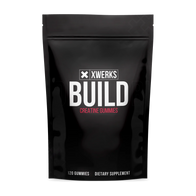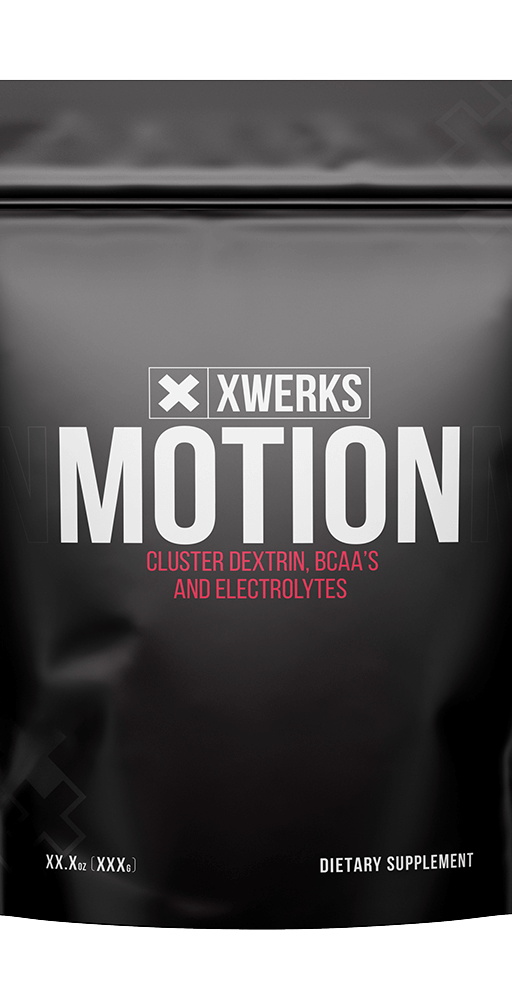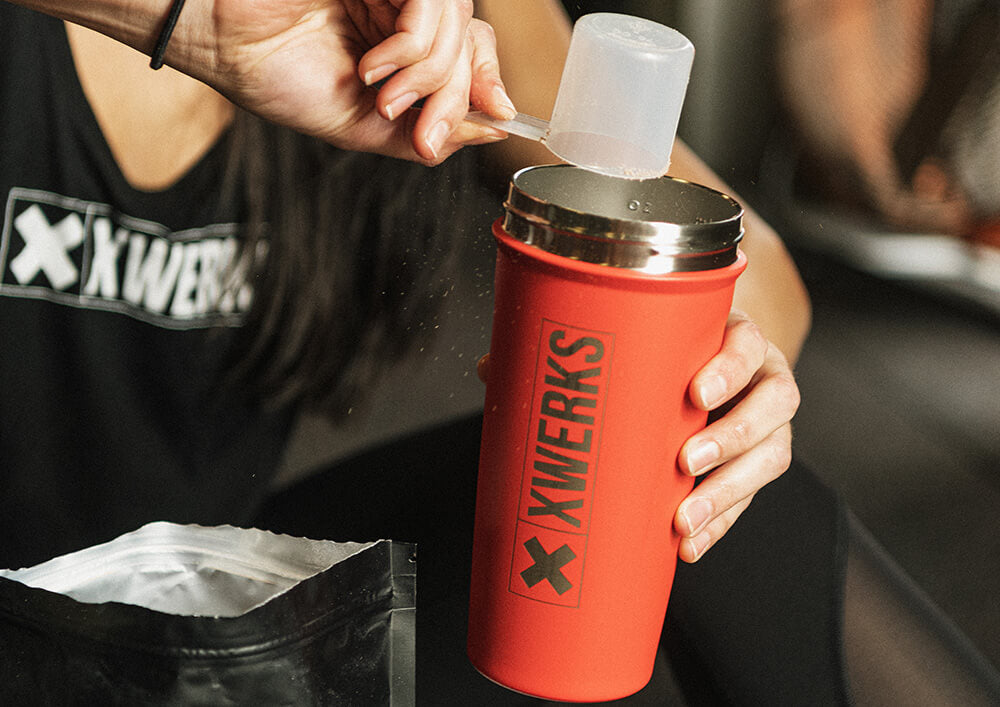One thing we can all agree on is that a healthy lifestyle consists of:
- Rest
- Physical activity
- Nutrition
That last one- nutrition- is especially important for your strength and physique goals. Most of your nutrition needs to come from whole foods so that you can be sure you’re putting as much good into your body as possible. Therefore, supplements are fairly unnecessary for those who are working out for general fitness and amateur lifters.
The one exception to this rule is protein powder.
While you don’t necessarily need whey protein to meet your workout goals, the benefits associated with it are so great that it’s almost essential for both novices and professionals.
However, despite its popularity, most people really don’t know how to use it properly. For instance, there are some people who believe that more is better. This does make sense, somewhat. After all, protein is the building block of our muscles- so it does stand to reason that the more we consume, the bigger and stronger our muscles become.
That being said, it’s actually a lot more complicated than that. In order to understand how much whey we should be using, we must first understand what it is.
Whey Explained
Whey is one of the two forms of protein sourced from milk. It’s the liquid that is created during the process of making cheese. Also, if you’ve ever eaten yogurt, it’s that liquid that is floating at the top when you open it.
Whey protein is the most studied supplement in the industry. It has been proven to be a high-quality source of protein for athletes and serves as a meal replacement for anyone who wants to boost their protein consumption.
On average, one serving of whey protein offers 20 to 27 grams of protein. A 4-ounce chicken breast offers approximately 24 grams, which is equivalent.
The remainder of your nutrition is made up of fats and carbs in similar amounts as a high-quality protein. While it’s true that most of your nutrition should come from whole foods, supplementing with whey protein powder is easy and useful when implemented appropriately. One way to increase your protein consumption without changing your diet is to drink a protein shake between meals.
Ideal Daily Protein Consumption
This leads us to the question: how much protein do you need to see benefits? This depends on a variety of factors:
- Genetics
- Fitness level
- Activity level
Your long-term goals for your strength, physique, and overall wellness will also need to be considered.
A sedentary adult needs at least 0.8 grams of protein per kilogram of body weight- which comes out to 0.36 grams of protein per pound of body weight. This is the absolute minimum that you need to maintain general health.
If you have a bigger goal, you will want to increase this amount. In the past, experts suggested 1 gram of protein/pound of body weight. However, research now indicates that ideally, you need 1.2 to 1.7 grams/kilogram of bodyweight. This means 0.72 grams/pound, which is double the minimum.
That being said, more doesn’t always mean better. If you’re active, an average of 1.6 grams/kilogram of body weight is the point where you reach what is known as diminishing returns.
For those who are generally active, up to 1.7 grams/kilogram will result in muscle gain- but anything more than that is pointless. More than 2.2 grams/kilogram is unnecessary for most people. However, much of the research in this area conflicts.
Of course, it’s important to note that increasing protein consumption can help with weight loss and shouldn’t be discounted.
Protein for Weight Loss
Consuming protein for weight loss works because a diet that is high in protein is more filling and your body requires more energy to digest proteins than fats or carbs. This is known as the thermic effect of food- your body burns energy to break down food to create more energy.
One study revealed that the thermic effect of protein was 20% to 30%, carbs were 5% to 10%, and fats were 0% to 3%. While it’s difficult to come up with a specific number, about 25% to 30% of your diet should be protein.
Of course, it’s also important that you don’t ignore fats and carbs. After all, these are also critical for hormone balance as well as a variety of other functions.
Protein for Muscle Growth
This probably leaves you wondering what this means for those who are serious about bulking up, such as bodybuilders. The above recommendations work for athletes, but if you want to body build competitively, your needs will be slightly different because you need to preserve your muscle mass while also keeping body fat low.
Therefore, consuming 2.2 to 3.2 grams of protein/kilogram of body weight can be helpful. This allows you to cut while also maintaining muscle mass. However, in order for this to apply to you, it’s important that you are already lean.
Even if you have 15% body fat, these recommendations don’t apply. Men under 10% body fat may want to consider consuming a higher amount of protein to maintain their lean muscle. However, for everyone else, the above recommendations are ideal for developing physique, strength, and overall wellness.
Types of Whey Protein
All of the above being said, this still doesn’t answer the question about how much whey we need to be consuming. This is because there are different types of protein powders.
Each one has a different level of filtration and processing. This means that there are varying levels of protein, fats, and carbs in each one. Your decision regarding which one is ideal for you depends on your budget, fitness level, and overall goals.
While it many cases, it makes sense that more would be better- the truth is, more protein is not necessarily better for you. What ends up happening is that you waste a lot of it if you push it too far. Ultimately, you end up having t take different amounts of whey protein to hit your target. For example, if your goal is 20 grams of protein, and your powder is 70% protein, you need to consume 28 grams of the powder.
Whey Protein for Overall Wellness
If you couldn’t tell by now, whey protein is one of the best ways to level up your nutrition, improving your physique and increasing your strength. Of course, it’s important to note that while supplements can help, it’s important that most of your nutrients come from whole foods.
That being said, once you have secured a good diet, protein powder- along with other supplements- can turbocharge your progress. You must also make sure you’re working out properly and getting the rest your body needs. Once you establish those three pillars, you will be well on your way to creating the best version of yourself.
References
“Benefits of Whey Protein Isolate: And Why It Is the “Whey” to Go.” IdealFit, 7 July 2016, www.idealfit.com/blog/whey-protein-isolate/.
Larry Lewis. “What Is a Healthy Lifestyle?” Healthylifestylesliving.com, 28 Jan. 2019, www.healthylifestylesliving.com/health/healthy-lifestyle/what-is-a-healthy-lifestyle/.
M, Calcagno, et al. “The Thermic Effect of Food: A Review.” Journal of the American College of Nutrition, 1 Aug. 2019, pubmed.ncbi.nlm.nih.gov/31021710/.
Mayo Clinic Staff. “Whey Protein.” Mayo Clinic, 2017, www.mayoclinic.org/drugs-supplements-whey-protein/art-20363344.
“What Is Whey Protein Concentrate? + Benefits and Uses.” Natural Force, naturalforce.com/blogs/nutrition/what-is-whey-protein-concentrate.
“What Is Whey Protein Hydrolysate.” Formula Sense, formulasense.com/ingredient-interpreter/what-is-whey-protein-hydrolysate.






















